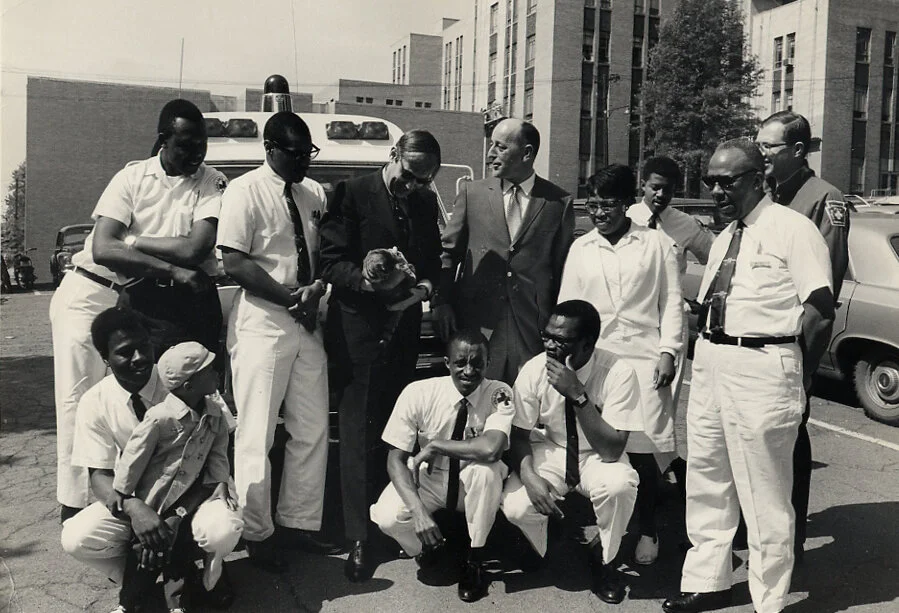The Forgotten Legacy of Freedom House Ambulance Service
It’s difficult to imagine hospitals without the life-saving services that ambulances and paramedics provide, but prior to 1967, these services didn’t exist. And the modern emergency services that we know today have roots in an unexpected place: a predominantly Black neighborhood called the Hill District, in Pittsburgh, Pennsylvania.
Before the mid 1960s, ambulance services were mostly provided by the police. They did not provide life-saving care; only a rushed ride to the closest hospital, and on occasion, basic first aid. In 1966, a paper by the National Academy of Sciences stated that inadequate emergency response in route to hospitals caused the accidental and avoidable deaths of over 50,000 people per year. Later that same year, the Governor of Pennsylvania and former mayor of Pittsburgh, David L. Lawrence, suffered a heart attack and died en-route to the hospital. His death drew attention to the issue, and in 1966, Peter Safar, Lawrence’s physician, and Phil Hallen, former ambulance driver and head of the Maurice Falk Fund, teamed up to improve the city’s response to medical emergencies.
At the time, Hallen and the Maurice Falk Fund were working to create jobs for African-American men in Pittsburgh, seeking to find opportunities for those the local media had dubbed “unemployables”. They teamed up with Freedom House Enterprises, a civil rights group, and together, went to work to create the blueprint for ambulance services today.
Twenty five men were recruited from the Hill District, a low income, Black neighborhood. Some had suffered long term unemployment, some hadn’t graduated high school, some were felons, some were war veterans. Suddenly, all were training to be life-saving allies to the city. They were trained for 32 weeks, completing a course that included anatomy, physiology, CPR, advanced first aid, nursing, and defensive driving, and by 1967, the first two ambulances with life-saving care were officially operating.
Soon they were known for their high standard of care, often being requested over the police services that the city provided. In their first year of operation, Freedom House Ambulance Service responded to almost 5,800 calls, transported more than 4,600 patients, and saved more than 200 lives, all with an average response time of less than ten minutes. They improved wait times to all parts of the city, and brought life-saving care to Black neighborhoods that previously had none. Due to the overwhelming success of the program and curriculum, Freedom House Ambulance Service became the national standard for paramedics.
However, not all were proponents. Freedom House paramedics faced racism from patients, hospital workers and city government. In 1970, Peter F. Flaherty, a vocal opponent of Freedom House, became Mayor of Pittsburgh, and began a campaign to end Freedom House’s services. He cut their budgets by 50%, denied requests to expand their contracts, and banned the use of ambulance sirens in downtown Pittsburgh, causing their response times to slow and their proven record to diminish. By 1975, the Mayor announced the creation of citywide ambulance services staffed by non-police paramedics, and ended the city's contract with Freedom House Ambulance Service. All succeeding ambulance drivers under the new city services were white. Even into the late 1990’s, 98% of Pittsburgh’s paramedics were white.
Freedom House Ambulance Service was a program built and sustained by hard working Black men, providing a service for all. They paved the way for the emergency services that we know and expect today, with little credit or mention of their part in its creation. Though nearly 55 years have passed, Black-owned and operated businesses and programs are still fighting an uphill battle despite their successes. We’re hoping to eliminate that barrier, to make it easier for Black-owned successes to be celebrated and contributions to be known.
Next time you or a loved one receives life-saving ambulance care, you can thank the brave men of the Freedom House Ambulance Service for paving the way for your safety.


